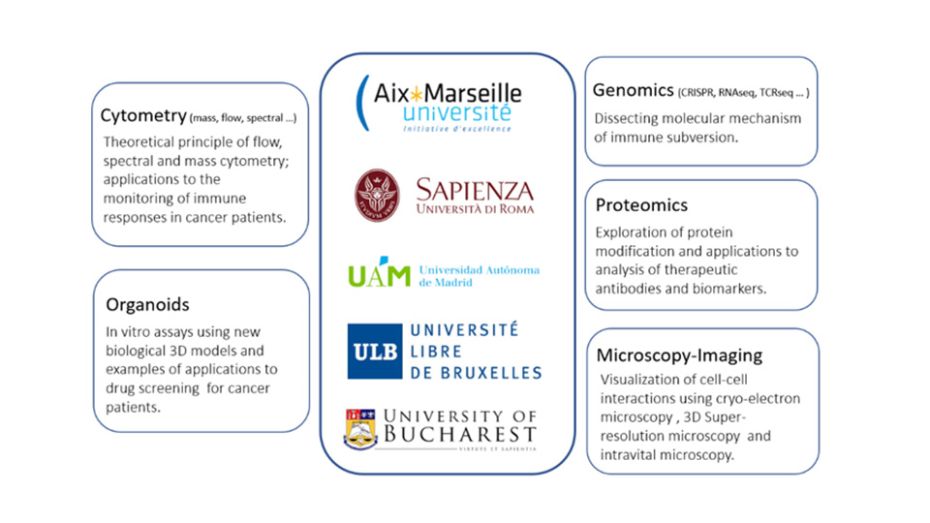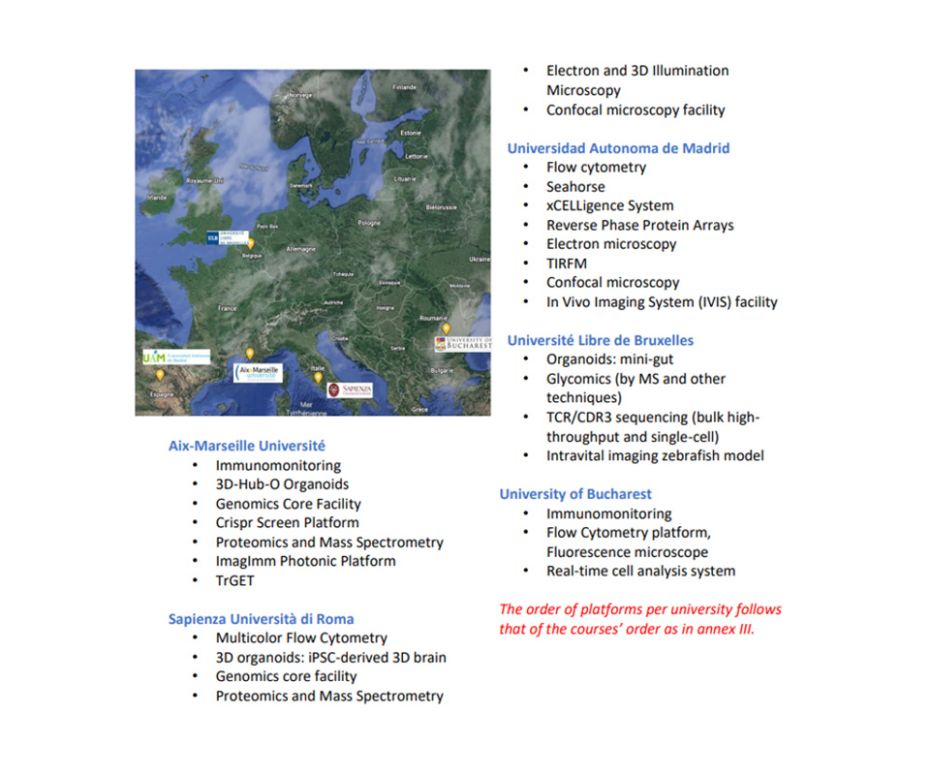
The Institut Cancer et Immunologie (ICI) offers Master and PhD students the opportunity to follow a mixed international mobility program on the theme "Technical innovations in basic and translational research: Applications to immunology-oncology (IO)" within the universities of the CIVIS alliance. A virtual mobility in the form of e-learning (webinars and videos) and a physical mobility of 5 days in high-tech scientific platforms, will allow students to discover or deepen their skills in Immuno-Oncology.
The virtual mobility is accessible to all students, Masters and PhD, the physical mobility on scientific and technical platforms is reserved for Masters students.

First joint mobility program in immunology-oncology of the Institute of Cancer and Immunology within CIVIS, the European civic universities.
Technical innovations in basic and translational research
Applications in Immunology-Oncology
September 2021 to June 2022, interdisciplinary, asynchronous and multi-campus
Program
The fundamental objective of the proposed program is to prepare future scientists and physicians for major developments in current concepts in the field of immuno-oncology by approaching the issues from a technical perspective. Thus, the teaching will focus on technical applications in fundamental, translational and clinical immuno-oncology, through a mixed mobility curriculum. The first component will be a virtual component with 5 courses as illustrated in the following diagram.

The courses contain digital vignettes of approximately 60 minutes each as follows:
1) Cytometry (mass, flow and spectral)
- Multi-color flow cytometry for phenotypic characterization of tumor infiltrating T cellsSilvia Piconese, Sapienza University of Rome
- Real-time cell analysis in the field of immuno-oncology, Mihaela Economescu, Stefan S. Nicolau Institute of Virology, Bucharest Romania
- Multiparametric flow cytometry analysis for phenotypic characterization of age-associated changes in circulating T cell subsets, Maria Mittelbrunn, Universidad Autonoma de Madrid
- Evaluation of neutrophil functions in the tumor microenvironment, Luminita Marutescu, University of Bucharest
- Cancer immunomonitoring - NK cells and cancer, Gratiela Gradisteanu, University of Bucharest
- Detection of immune checkpoints and their ligands in the tumor environment by multicolor flow cytometry, Lilia Matei, Stefan S. Nicolau Institute of Virology, Bucharest, Romania
- Evaluation of immune function in tumors using xMAP multiplex technology, Coralia Bleotu, Stefan S. Nicolau Institute of Virology, Bucharest Romania
- Multicolor imaging flow cytometry for characterization of cancer response to drug treatments, Cristina Elena Staicu, National Institute of Laser, Plasma and Radiation Physics, University of Bucharest; Livia Elena Sima, Institute of Biochemistry of the Romanian Academy
- Mass Cytometry - Principles and ApplicationsAmira A Ben Amara, Aix-Marseille University
- Spectral flow cytometry, Manon Richaud, Institut Paoli Calmettes, CRCM, Aix-Marseille University
- Computational methods for the analysis of flow and mass cytometry data, Anne-Sophie Chretien, Aix-Marseille University
2) Organoids
- Organoids: New biological models for developmental biology and cancer research, Géraldine Guasch, CRCM, Aix-Marseille University
- Ex vivo culture of organoids for personalized medicine and regenerative medicine, Marie Isabelle Garcia, Université Libre de Bruxelles
- 3D in vitro models of the human nervous system: challenges and opportunities, Alessandro Rosa, Sapienza University of Rome
- In vitro assessment of cellular energy metabolism and cell growthPetronila Penela; Angela Albitre; Laura Formentini, Universidad Autónoma de Madrid
- Animal models for tumor immunology/mouse models for cancer immunotherapy research, Catalina Ribas; Kostas Stamatakis; María Sanz, Universidad Autónoma de Madrid
3) Genomics (CRSPR, RNAseq and TCRseq):
- Functional genomics using CRISPR screeningSandrine Roulland, Aix-Marseille University
- DNA microarrays and RNAseq in cancer transcriptomicsRodolfo Negri, Sapienza Università di Roma
- Single cell RNA-seq (scRNAseq), Pierre Milpied, CIML, Aix-Marseille University
- TCR/CDR3 sequencing: insights into T cell development and anti-cancer response, David Vermijlen, Center for Research in Immunology (U-CRI), Université Libre de Bruxelles
- Hands-on Introduction to RNA-Seq, Sumeet Pal Singh, IRIBHM, Université Libre de Bruxelles
4) Proteomics
- Protein analysis by mass spectrometry, Marco Crescenzi, Sapienza Università di Roma, Istituto Superiore di Sanità; Serena Camerini, Istituto Superiore di Sanità
- Characterization of IgG glycosylation and its impact in cancer and immunology, Cédric Delporte; Yosra Helali, Université Libre de Bruxelles
- Reverse phase protein arrays: Identification of protein biomarkers of diseases, José M. Cuezva, Universidad Autónoma de Madrid
- Targeted Proteomics: Development of quantitative proteomics based on parallel reaction monitoring (PRM) applied to her2-positive breast cancerLuc Camoin, Aix-Marseille University
- Maldi imaging and therapeutic antibodies: application to glioma, Daniel Lafitte, Aix-Marseille University
5) Microscopy-Imaging
- Cryo-electron microscopy (Cryo-EM) for the study of fine cellular structures and protein complexes in immune cells and cancer cells, Luciana Dini, Sapienza Università di Roma
- 3D structured illumination microscopy for the study of nuclear integrity and cancer invasionIsabella Saggio, Sapienza Universita di Roma
- Spatio-temporal organization of macromolecular complexes involved in lymphocyte signaling, Didier Marguet, CIML, Aix-Marseille University
- Isolation and characterization techniques for the study of exosomes, María Yáñez-Mó, Universidad Autónoma de Madrid; Mar Valés-Gómez; Noa Martín Cofreces
Students will be provided with the theoretical and technical basis to understand the functioning of these innovative technologies, as well as the applications to the exploration of anti-tumor immunity in aspects ranging from basic research to clinical approaches. The critical step of data analysis using machine learning algorithms will also be addressed in the different themes.
The second component will be a 5-day short-term mobility exchange within the scientific platforms The second component will be a 5-day short-term mobility exchange within the CIVIS immunology-oncology network as illustrated in the following diagram.

This component will allow students to experience in practice what they have learned in the virtual component. Based on a detailed application form, they will be directed to a platform that matches their selection parameters. We do not anticipate any flow problems (e.g. students cannot find the platforms) as there are a variety of platforms with overlapping technologies.
Registration
Registrations are closed since September 30, 2021
Useful information
Virtual Mobility
Available soon!
Physical mobility
Available soon!
Organizing Committee
- Anne-Sophie Chrétien, Aix-Marseille University (AMU), Institut Paoli Calmettes (IPC), Institute of Cancer and Immunology (ICI), Marseille Faculty of Medicine, Marseille Cancer Research Center (CRCM)
- Marie-dominique Franco, Project Manager, Institute of Cancer and Immunology (ICI, AMU)
- Luminita Marutescu, University of Bucharest, Faculty of Biology, Department of Biotechnology and Renewable Resources, Systems Biology and Ecology Research Platform
- Catalina Ribas and María Yánez Mo, Autonomous University of Madrid, Faculty of Science, Department of Molecular Biology.
- Loretta Tuosto, Sapienza Università di Roma, Faculty of Mathematical, Physical and Natural Sciences, Charles Darwin Biology and Biotechnology Department (BBCD)
- David Vermijlen, ULB Center for Research in Immunology (U-CRI), Faculty of Pharmacy, Department of Pharmacotherapy and Pharmacy and Center for Research in Immunology
About CIVIS
CIVIS is a European civic university formed by the alliance of nine of Europe's leading higher education research institutions: Aix-Marseille University, National and Kapodistrian University of Athens, Universitatea din București, Université libre de Bruxelles, Universidad Autónoma de Madrid, Sapienza Università di Roma, Stockholm University, Eberhard Karls Universität Tübingen and the University of Glasgow.
It brings together a community of over 384,000 students and 55,000 staff, including 30,000 academics and researchers.
Partner universities of the 1st international mobility programme with Aix-Marseille University :
- National and Kapodistrian University of Athens(Athens, Greece)
- Sapienza Università di Roma (Rome, Italy)
- Stockholm University (Stockholm, Sweden)
- Tübingen University (Tübingen, Germany)
- Universidad Autonoma de Madrid (Madrid, Spain)
- Université Libre de Bruxelles (Brussels, Belgium)
- University of Bucharest (Bucharest, Romania)
- University of Glasgow(Glasgow, UK)
Registrations are closed since September 30, 2021 Registration form
INTERNATIONAL KEYNOTE SPEAKERS
-
Module Cytometry (mass, flow and spectral) Roberto Spada Fluidigm, Spain
-
Module Organoids and in vivo models Maxime Mahé, University of Nantes, France Federico Mayor Universidad Autonoma de Madrid, Spain
-
Module Genomics (CRISPR, RNAseq, scRNAseq and TCR Seq)
-
Module Proteomics Isabelle Fournier University of Lille, France
-
Module Microscopy-imaging Francisco Sanchez-Madrid, Universidad Autonoma de Madrid, Spain
email: ici-contact@univ-amu.fr


